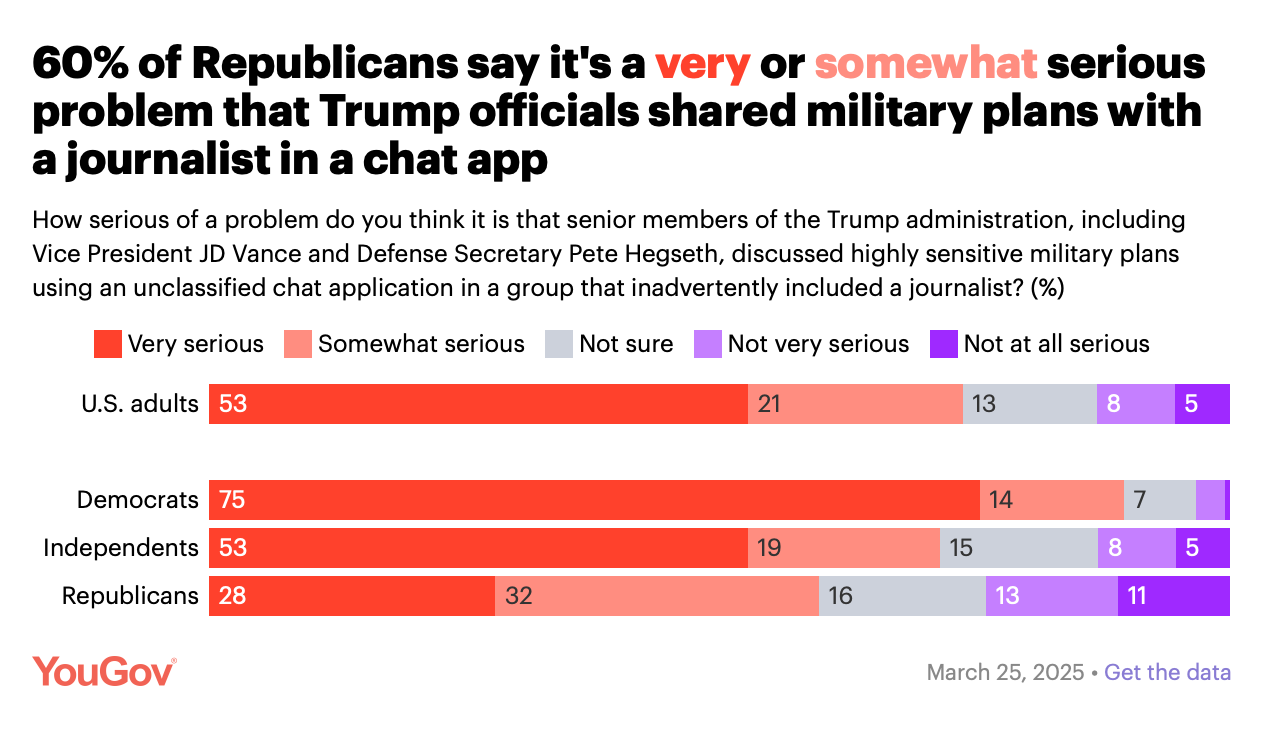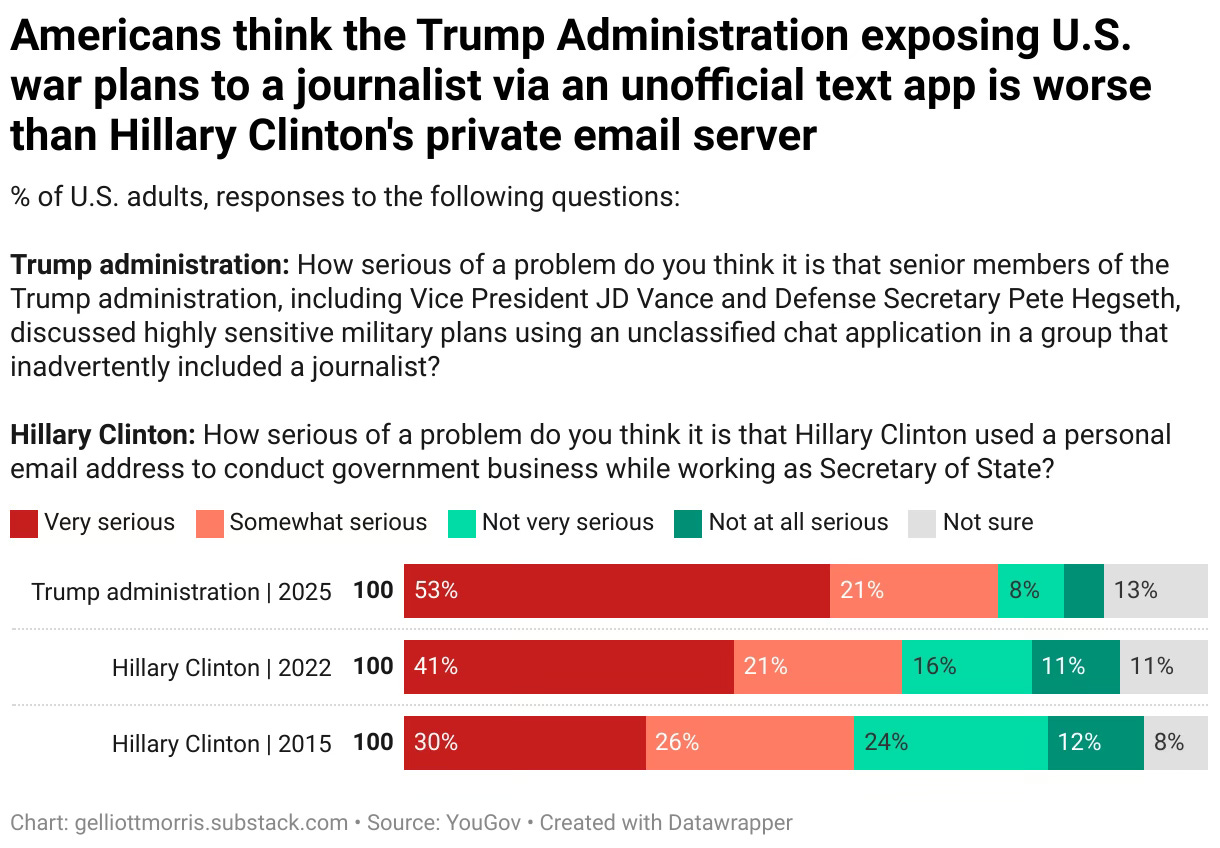74% of Americans, and 60% of Republicans, say the Trump administration’s scandal is a very or somewhat serious problem
If it’s Friday, it’s Chart of the Week here at Strength In Numbers.
It was obvious when preparing this week’s COTW that I needed to write about SignalGate — the fallout from the story in The Atlantic about senior Department of Defense and intelligence officials unintentionally sharing classified real-time U.S. war plans with a journalist over the encrypted messaging app Signal. I planned on writing something on the newest Index of Consumer Sentiment release from the University of Michigan this week — the ICS is now at a new low since December 2023, and long-term inflation expectations are actually higher than at any point since 2009 — but the news has moved on. And rightly so; adding a journalist to a text chain in which senior government officials are sharing intel on troop movements is a big deal.1
There is no COTW without data, though. While it is still too soon to know how all Americans will react to the news and what its true consequences will be (not every adult will have heard about this or processed it), we do have some quick-turnaround polling data to assess the public’s initial reactions. Let’s take a look:
The data for this Chart of the Week comes from three YouGov surveys conducted in 2015, 2022, and on Tuesday, March 25, a day after the Atlantic story published online. The chart below recreates part of one in this excellent writeup by Director of Survey Data Journalism Taylor Orth. She writes:
conducted the day after this information was revealed found that most Americans — 74% — say the conduct by Trump administration officials is a very (53%) or somewhat (21%) serious problem. The leak of military operations information is viewed as a very or somewhat serious problem by 89% of Democrats, 72% of independents, and 60% of Republicans.
Here’s YouGov’s chart:

That is really the one thing from the poll you need to internalize. People think the leaking is serious, including Republicans.2 It follows that something should be done about it. But what will that be? Are there any likely electoral implications from this?
One thing we can do is compare theSignalGate numbers to the data from a comparable event. Needless to say, a perfect analogue does not exist (nobody has ever added a journalist to a text chain on a commercial app discussing official U.S. government war plans before), but a recent event we can benchmark against is Hillary Clinton’s use of a private email server to conduct official State Department business. YouGov asked Americans whether they thought that was a serious problem in 2015 and 2022, and we can use the results from those polls to figure out the practical meaning of the results of the this new poll on the Trump administration scandal.
Here’s the data:
- In 2015, 30% of Americans said that it was a “very serious” problem that “Hillary Clinton used a personal email address to conduct government business while working as Secretary of State.”
- By 2022, that percentage had risen to 41%.
- On March 25, YouGov asked, “How serious of a problem do you think it is that senior members of the Trump administration, including Vice President JD Vance and Defense Secretary Pete Hegseth, discussed highly sensitive military plans using an unclassified chat application in a group that inadvertently included a journalist?”
- 53% of adults said they thought the problem was “very serious,” and an additional 21% said “somewhat serious,” for a combined 74% saying it was more serious than not.
And here’s the chart with all that data:

Additionally, 48% of adults said they thought the actions of Hegseth, Vance and others in the chat violated U.S. law. That doesn’t mean they did, of course, but that’s a good measure of how seriously the public is taking this. In 2015, 41% of Americans thought Clinton broke the law with her private server.
This is the latest in a string of bad news for the president: In the first week of the Strength in Numbers COTW, I had a chart of falling stock market prices; Last week, I published an average of Trump’s job approval rating and it was negative and falling; And this week, the administration has faced a classified information scandal, backlash for which run across party lines. I don’t expect these to always be about Trump, or always negative, and especially always negative and about Trump, but that’s how the news has shaken out recently.
Footnotes
-
Adam Carlson, a market researcher who posts a lot about political polling on Twitter, has the chart I was going to make anyway: Average Trump job approval on the economy. ( It’s bad.) ↩
-
It’s worth noting the Republican number because, in an age of polarization, we would expect that number to be much lower if this weren’t important to voters. The fact it is this high is a sign the scandal goes beyond traditional partisan splits. ↩